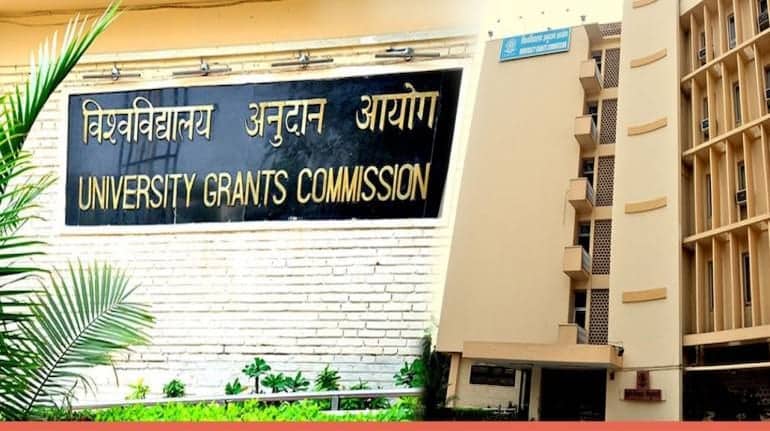What’s in today’s article?
- Why in News?
- About the University Grants Commission (UGC)
- About the draft Guidelines
- Significance of the draft Guidelines
- Issues with the draft Guidelines
Why in News?
- The UGC has placed two draft guidelines – Recognition and Grant of Equivalence to Qualifications obtained from Foreign Educational Institutions Regulations 2023 – in public domain for comments/feedback.
- The norms come at a time foreign universities are setting up campuses in India’s GIFT city and Indian universities collaborating with universities abroad to offer dual or joint degrees.
The University Grants Commission (UGC):
- Genesis:
- The Sargeant Report was the first attempt to formulate a national system of education in India in 1944.
- It recommended the formation of a University Grants Committee, which was established in 1945 and was tasked with dealing with all of the then-existing Universities in 1947.
- Soon after independence, the University Education Commission was established (in 1948) under the chairmanship of Dr. S Radhakrishnan to report on Indian university education and suggest improvements and extensions.
- It proposed reorganising the University Grants Committee along the lines of the University Grants Commission of the United Kingdom.
- As a result, the UGC was formally inaugurated in 1953 by Maulana Abul Kalam, the then Minister of Education.
- However, the UGC was established [by the Ministry of Education’s Department of Higher Education] as a statutory body in November 1956 by the UGC Act 1956.
- A proposal to replace UGC with another new regulatory body called the Higher Education Commission of India (HECI) is under consideration by the Government of India.
- Mandate:
- The UGC has the unique distinction of being the only grant-giving agency in the country which has been vested with two responsibilities of:
- Providing funds
- Coordination, determination and maintenance of standards in institutions of higher education.
- The UGC`s mandate includes:
- Promoting and coordinating university education.
- Determining and maintaining standards of teaching, examination and research in universities.
- Framing regulations on minimum standards of education.
- Monitoring developments in the field of collegiate and university education, disbursing grants to the universities and colleges.
- Serving as a vital link between the Union and state governments and institutions of higher learning.
- Advising the Central and State governments on the measures necessary for improvement of university education.
- The UGC has the unique distinction of being the only grant-giving agency in the country which has been vested with two responsibilities of:
About the draft Guidelines:
- It covers internationally relevant curricula, academic and research collaboration with foreign universities and credit recognition under twinning arrangements.
- Qualification obtained from a foreign higher educational institution (HEI) shall be recognised and granted equivalence provided the qualification has been awarded by a foreign HEI that is duly recognised in its home country.
- The student should have pursued the programme through regular, in-person instruction (and not through online or distance learning).
- The entry-level requirements for admission to the programme should be similar to that of a corresponding programme in India.
- The “similarity” of entry criteria will be determined through due process by the standing committee set up for the purpose based on –
- Similarity of minimum duration of the programme in India and the foreign country;
- Minimum credit requirements and
- Evaluation processes.
- The regulations will not be applicable to professional qualifications awarded by foreign educational institutions in disciplines such as Medicine, Pharmacy, Nursing, Law, and Architecture.
Significance of the draft Guidelines:
- These guidelines restrict degrees obtained through distance learning and online mode as well as through franchise agreement and for qualification obtained from schools affiliated to foreign boards.
- A dedicated online portal to receive applications for granting equivalence will be created for a smooth movement of students to the Indian setup.
- This equivalence certificate will certify the “parity of a qualification” between a foreign qualification and that awarded by an Indian board or university at the same level.
- The certificate will be valid for admission to Indian universities or employment purposes.
Issues with the draft Guidelines:
- The guidelines could be in contravention with the gazetted notification whereby the Association of Indian Universities’ (AIU) is currently the competent authority to award equivalence to foreign degrees.
- UGC should first look at equivalence of Indian degrees. Degrees issued by Indian universities as per Sec 22 of UGC Act need to be considered equivalent by all state governments.
- This will solve many issues faced by the graduates from Indian universities.
Q1) What is the Sargent report?
The Sargent Report on Post-War Education Development in India, was a 1944 memorandum or the first comprehensive plan to address all levels and facets of education, including technical, vocational, and professional education.
Q2) What is the Higher Education Commission of India (HECI)?
The HECI is supposed to replace the University Grants Commission – a statutory body responsible for the maintenance of the standard of higher education in India. HECI shall function as a body that lays down uniform standards for the development of education in India.
Source: UGC draft on foreign degrees may not conform to AIU rules | IE
Last updated on June, 2025
→ UPSC Notification 2025 was released on 22nd January 2025.
→ UPSC Prelims Result 2025 is out now for the CSE held on 25 May 2025.
→ UPSC Prelims Question Paper 2025 and Unofficial Prelims Answer Key 2025 are available now.
→ UPSC Calendar 2026 is released on 15th May, 2025.
→ The UPSC Vacancy 2025 were released 1129, out of which 979 were for UPSC CSE and remaining 150 are for UPSC IFoS.
→ UPSC Mains 2025 will be conducted on 22nd August 2025.
→ UPSC Prelims 2026 will be conducted on 24th May, 2026 & UPSC Mains 2026 will be conducted on 21st August 2026.
→ The UPSC Selection Process is of 3 stages-Prelims, Mains and Interview.
→ UPSC Result 2024 is released with latest UPSC Marksheet 2024. Check Now!
→ UPSC Toppers List 2024 is released now. Shakti Dubey is UPSC AIR 1 2024 Topper.
→ Also check Best IAS Coaching in Delhi
























